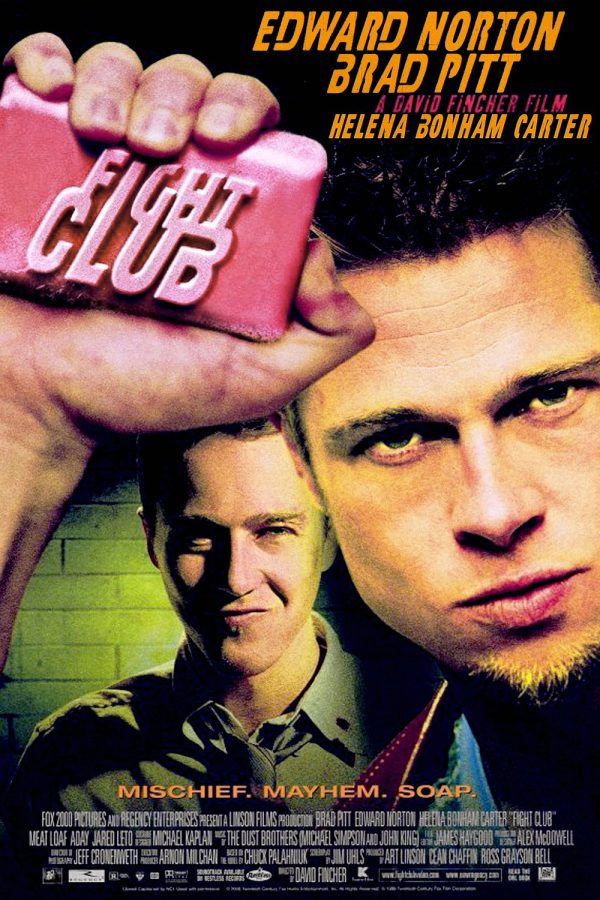Fight Club & Its Portrayal of Toxic Masculinity
Synopsis
David Fincher’s Fight Club is about a man suffering from insomnia who befriends a soap salesman named Tyler Durden. The Narrator and Tyler Durden start living together and start Fight Club. They bring other men into this club who are also done with living boring lives. This leads to an even more extreme situation down the line.
Fight Club is an incredible story of toxic masculinity and mental health. It dives deep into the societal views of what men are supposed to be like. This can come in the form of bottling up emotions, the hatred of women, or simply believing being kind is weakness. These views are dangerous to everyone. I’m sad to see and hear young men idolize Fight Club for its toxic masculinity or its two lead characters. As much as I love the film and want as many people to watch it, I believe that you need to be a certain type of mature to truly understand what it’s making fun of and portraying.
Toxic Masculinity
Fight Club is notorious for its portrayal of what a “real man” is as that’s the entire premise of the club. The Narrator and Tyler, an imaginary depiction made by the Narrator, start Fight Club to show how fighting as a man and feeling pain without seeking help makes them men. Tyler Durden is an imaginary reflection of who the Narrator wants to be. The Narrator created Tyler to change his life; to become everything he wanted that he believed was what masculinity was. The Narrator is able to correct this because he still slipped back into himself. Tyler even starts a terrorist organization, Project Mayhem, from Fight Club. This instills into the idea that toxic masculinity is dangerous and harms men themselves and everyone around them.
Mental Health
The mental health of the Narrator is a huge factor into the starting of Fight Club. He suffers from insomnia leading him to join several support groups of people who are dying. These support groups give him the place to be listened to, understood, and cry. His strong emotions gave what he needed in order to sleep through the night for the next year. Marla Singer ruins this for him as she’s there for the same reason and The Narrator notices this catching him off guard. The Narrator couldn’t use these support groups effectively with another liar there. So they make a deal to split up the groups, so the fakers don’t run into each other again. Then the Narrator meets Tyler Durden and they create Fight Club also curing Tyler of his insomnia, but unfortunately not in a healthy way.
Fight Club sparks the toxic masculinity within the Narrator, which mixed with his poor mental health wasn’t good for him. This led to him seeking pain, from fighting other men to hurting himself. When Marla tries to speak to him about the harm his body has endured or Tyler, he pushes her away. Marla doesn’t know of Tyler because she only knows the Narrator being Tyler. The Narrator’s toxic traits and ideas of masculinity only makes this worse.
Therapy
The Narrator joining these support groups and thinking of a happy place is a form of therapy for him. Tyler pushes this narrative of therapy as running away from the pain and makes it seem weak to do these therapeutic acts. This is a huge factor of toxic masculinity to make it seem that seeking help or asking for it is weak. When in reality it’s far from being weak. Tyler instills the idea of getting help as weak in the Narrator’s brain making him forget all about his meditation and other therapeutic activities he learned from his support groups.
Relationships
The Narrator’s relationship with Marla is a confusing one as in Marla’s eyes he treats her terribly sometimes and blows her off other times. The Narrator likes Marla a lot, but rejects her because Tyler tells him that she’s no good and he doesn’t want to be plagued with another woman in his life. This is a great example of how toxic masculinity can be a destroyer of relationships and helps no one, not even the person who falls victim to it.
TikTok
Men and boys alike on TikTok idolize Tyler Durden for how he’s incredibly masculine and that they either “are him” or “want to be him”. These ideas of masculinity are extremely dangerous. Tyler is supposed to be a symbol of what’s not a good representation of what a man should be. He created a terrorist organization and carried out plenty of terrorist attacks. Tyler is the personification of the dangers of toxic masculinity and what it results in. It’s incredibly saddening to me that a huge portion of the male audience cannot realize this and understand that Tyler is not supposed to be idolized. That they do not want to be Tyler, that what they want to be is better. Not what society’s depictions on what a man should be and their advocating for toxic masculinity. In all, I recommend this movie to all audiences who are mature enough to understand that Fight Club shouldn’t be an idealization of masculinity, but an idea of what it shouldn’t be.
My Favorite Quotes and Songs in Fight Club
Quotes:
- “Why do people think that I’m you? – The Narrator
I think you know. – Tyler
No, I don’t. – The Narrator
Yes, you do. Why would anyone possibly confuse you with me? – Tyler
I don’t know … because we’re the same person. – The Narrator
That’s right. – Tyler”
- “You met me at a very strange time in my life.” – The Narrator
- “His name is Robert Paulson” – The Narrator
Songs:
- Where Is My Mind? By The Pixies
Rating: 9.5/10





